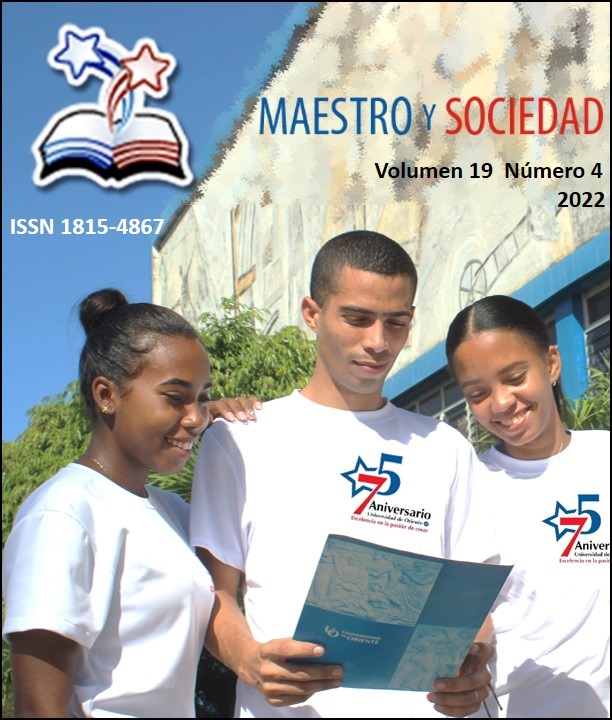Training and development of research skills in higher education from virtuality: the case of Ecuador
Training and development of research skills in higher education from virtuality: the case of Ecuador
Keywords:
investigative skills, higher education, critical thinking, trainingAbstract
The objective of the work is to apply the investigative skills of conceptual and methodological construction to the students of the Pedagogy career, as part of their training in the subject Models and Processes of Diagnostic Educational Research from virtuality. The inquiry responds to the mixed approach through the action-research design that had a descriptive scope. The methods of the theoretical order: analytical-synthetic, inductive-deductive; and empirical: observation, unstructured interviews and measurement. The application of investigative skills in the applied sample contributed to awakening critical thinking, since the tasks implicitly carry cognitive skills. Based on the results obtained, it is necessary to establish an action plan for those actions that did not achieve excellent performance.
References
Academia Internacional de Humanismo. (2000). Manifiesto Humanista. https://www.filosofia.org/cod/c1999hum.htm
Aldas-Arcos, H. G., Tabares-Arevalo, R. M. y Gonzáles-Espino, Y. (2017). Caracterización de la formación de habilidades investigativas en la carrera de Cultura Física en Ecuador. Podium, 12(2), 74-85. https://podium.upr.edu.cu/index.php/podium/article/view/703
Arévalo-Arevalo, C. I. y Arias-Castro, Y. Y. (2017). Formación de habilidades investigativas para el manejo de la información científico. ROCA, 13(3), 1-8. https://revistas.udg.co.cu/index.php/roca/article/view/344
Castillo-Lobo, L. P. (2020). La lectura inferencial como estrategia para fortalecer el pensamiento crítico. Revista Neuronum, 6(3), 187-194. http://eduneuro.com/revista/index.php/revistaneuronum/article/view/280.
Consejo de Aseguramiento de la Calidad de la Educación Superior. (2010). Ley Organica de Educacion Superior. Loes. https://sangregorio.edu.ec/include/archivos/files/LOES_2.pdf
Correa-Velasco, F. y España-Garcia, M. (2017). El pensamiento crítico en la investigación científica. INNOVA Research Journal, 2(9). https://revistas.uide.edu.ec/index.php/innova/article/view/267/400
Gómez-Armijos, C., Álvarez-Gómez, G., Romero-Fernández, A., Castro-Sánchez, F. J., Vega-Falcon, V., Comas-Rodríguez, R., y Velázquez, M. R. (2017). La investigación científica y las formas de titulación, Aspectos Conceptuales y Prácticos (Primera Edición ed.). Editorial Jurídica del Ecuador. Obtenido de https://www.researchgate.net/profile/Vladimir-Vega/publication/347966622_la_investigacion_cientifica_y_las_formas_de_titulacion_aspectos_conceptuales_y_practicos/links/60dea0ea92851ca9449efcad/la-investigacion-cientifica-y-las-formas-de-titulacion-aspecto
Hernández-Sampieri, R., Fernández-Collado, C. y Baptista-Lucio, P. (2014). Metodología de la investigación. McGRAW-HILL. https://periodicooficial.jalisco.gob.mx/sites/periodicooficial.jalisco.gob.mx/files/metodologia_de_la_investigacion_-_roberto_hernandez_sampieri.pdf
Illesca-Prieto, S. A., Bravo-López, G. y Tolozano-Benites, S. (2014). Las habilidades de investigación en estudiantes de Psicología de la Universidad de Guayaquil, Ecuador. Alteridad. Revista de Educación, 9(2), 151-160. Obtenido de https://www.redalyc.org/pdf/4677/467746089006.pdf
Machado-Ramírez, E. F. y Montes de Oca-Recio, N. (2009). Las habilidades investigativas y la nueva Universidad: Terminus a quo a la polémica y la discusión. Humanidades Médicas, 9(1). Obtenido de http://scielo.sld.cu/scielo.php?script=sci_arttext&pid=S1727-81202009000100002
Martínez-Aguilera, G. R. y Obregón-Gonzálea, E. B. (2017). Habilidades intelectuales específicas que favorecen el desarrollo de competencias para la investigación en la licenciatura en educación física. Educando para educar, 77-86. Obtenido de https://dialnet.unirioja.es/servlet/articulo?codigo=7186584
Moreno-Bayardo, M. (2005). Potenciar la educación. Un currículum transversal de formación. REICE - Revista Electrónica Iberoamericana sobre Calidad, Eficacia y Cambio en Educación, 3(1), 520-540. https://www.redalyc.org/pdf/551/55130152.pdf
Omar-Hechavarria, M. y Capdevilla-Leyva, B. (2013). El desarrollo de habilidades investigativas en la formación inicial de los estudiantes. EduSol, 13(43), 22-29. https://www.redalyc.org/pdf/4757/475748682003.pdf
Pegudo-Sánchez, A., Capote-Domínguez, T. E. y Perdomo-Ogando, J. M. (2013). Las habilidades investigativas en la Biomecánica. OLIMPIA. Revista de la Facultad de Cultura Física de Granma, 10(33), 82-94. https://dialnet.unirioja.es/servlet/articulo?codigo=6210854
Published
How to Cite
Issue
Section
License
Copyright (c) 2022 Fausto Iván Guapi-Guamán, Tunin Gilmar Murillo-Andrade, Elizabeth Del Rocío Falcones-Barbosa, Jordy Joe Murillo-Falcones

This work is licensed under a Creative Commons Attribution-NonCommercial-NoDerivatives 4.0 International License.
This journal provides immediate open access to its content, based on the principle that offering the public free access to research helps a greater global exchange of knowledge. Each author is responsible for the content of each of their articles.



























 Universidad de Oriente
Universidad de Oriente 